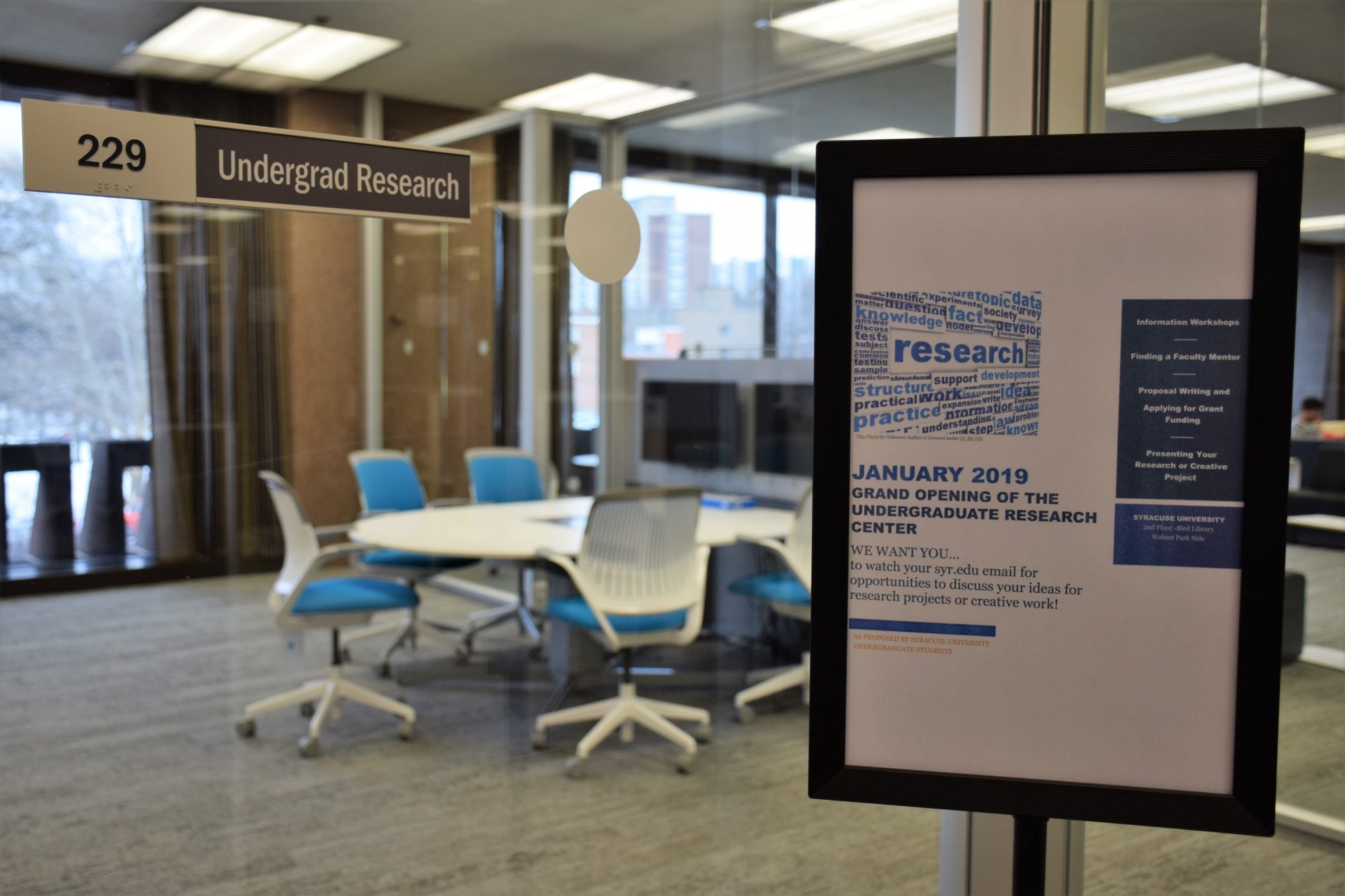
Syracuse University’s Undergraduate Research Center has a new home on the second floor of Bird Library, It has also launched an extensive new funding program for undergraduates conducting original research or creative work over the summer or for longer-term projects over the next academic year. The original work must be conducted with a faculty mentor. Summer research grants will be $2,800, and more substantial projects to be conducted through the 2019-20 academic year will be considered for funding up to $5,000. The summer and academic year funding programs are open to full-time undergraduates who are continuing students next academic year. The grants program spans all undergraduate programs. The deadline to apply is Feb. 28.
Through the application, students can also apply for summer research grants of up to $2,800 in a continuing program funded by the Student Association, Office of Research and Office of Academic Affairs. To apply for the Undergraduate Research grants and the summer research fellowships, visit the Syracuse University Application Portal. Proposals must be completed by students by 11:59 p.m. on Thursday, Feb. 28, for the spring 2019 cycle of funding for undergraduate research. Other funding opportunities through the program will be available later, including a request for a different group of proposals in the fall.
In fall 2018, Syracuse University announced the commitment of $1 million annually to support a new Center for Undergraduate Research, the collaborative vision of students, faculty, staff and administrators to strengthen the University’s position as a preeminent and inclusive student-focused research institution. With resources from the Invest Syracuse initiative, the new comprehensive undergraduate research center quadruples central University support for research and creative work by undergraduates.
The undergraduate research grants are funded through the University’s $100 million Invest Syracuse initiative, as part of the University’s founding of a program for undergraduate research. The mission is to deepen and extend research and creative opportunities for Syracuse students by providing greatly increased financial support and by facilitating effective mentoring.
“This first step and later programs in the fall will lead to a quadrupling of research and creative support from the central University for our undergraduates,” says professor of Earth sciences and College of Arts and Sciences Dean Emerita Cathryn Newton, who heads the initiative. “This initiative is in direct response to the Academic Strategic Plan in providing more students with more opportunities to explore their creativity and make discoveries in areas about which they are impassioned.”
Chancellor Kent Syverud praised the collective effort by multiple constituents—including the Student Association, the University Senate Research Committee and the Renée Crown University Honors Program—and the leadership of Cathryn R. Newton, senior advisor to the Chancellor and Provost for faculty engagement, who was charged with bringing together the best ideas of students, faculty and staff.
“I am grateful to Professor Newton, our students, faculty and staff for working so tirelessly to turn this vision into a reality,” says Chancellor Syverud. “There is evidence that this kind of commitment to undergraduate research will help us recruit, retain and graduate a more diverse and talented student body, and prepare them for post-graduate success.”
Reporting to both Provost Wheatly and Vice President for Research John Liu, the new center will expand access to undergraduate student research grants. Newton will oversee the implementation of the center until it is fully staffed.
“The enthusiastic and visionary work of students, faculty and staff has created an engine of advocacy for undergraduate research and creative work that will be recognized and respected across the campus,” says Newton. “This initiative delivers on multiple aspects of the Academic Strategic Plan, including support for discovery, innovation, student success and a commitment to diversity and inclusion. Undergraduate research and original creative work have powerful impacts on the success of all students, and these trends are even more pronounced across diverse constituencies. This elevates the climate of creativity for students on our campus in lasting ways.”
“The creation of the Center for Undergraduate Research is a vital step in supporting a more expansive and interdisciplinary research enterprise across the University,” says Wheatly. “By providing more centralized and coordinated support, we are encouraging increased research productivity across all University constituencies.”
The Center for Undergraduate Research will work across colleges and schools to foster and support diverse undergraduate engagement in faculty-guided scholarly research and creative inquiry, helping students identify and pursue internal and external research opportunities and support. It will also bring new efficiencies for proposal planning, undergraduate conferences, poster sessions and other activities to train, support and mentor students interested in research.
“Given the immense power of mentoring and original work in post-graduation success, this will have broad and long-lived effects,” says Newton. “Because our center defines research and creative inquiry broadly, it will impact students across disciplines and programs and open up avenues of research well beyond the STEM fields. Students will learn to understand disciplinary methodologies and norms, develop a repertory of research and communications skills, and communicate their findings to reach broader audiences beyond the classroom. They will see how new knowledge and discovery can impact the world.”
Cynthia Harris ’18, a recent graduate of the College of Arts and Sciences, was involved in conceiving and implementing the center. “Undergraduate research expands your horizons in so many ways: it vastly increases your network of people, and therefore the number of views to which you are exposed,” Harris says. “Having this million-dollar investment will greatly expand the experiences—and the networks—of students across the curriculum, and this will prepare them better for their lives and careers.”
Liu says this commitment to undergraduate research will further create a culture of curiosity and discovery on the Syracuse University campus: “By providing a more robust and focused path to scholarship and meaningful research, our undergraduates will be better positioned for competitive funding that supports further academic inquiry.”
Source: Combined stories By News Staff